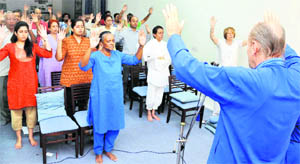|
The path to bliss
Paramhansa Yogananda’s
disciple Swami Kriyananda (J. Donald Walters) and his American
devotees teach yoga and meditation to Indians at Ananda Sangha
in Gurgaon, writes Sunit Dhawan

Swami Kriyananda feels there are thousands of receptive souls in India Photos: Sayeed Ahmed |
Truth,
they say, is stranger than fiction. From a spiritual
perspective, this seems to be part of some divine plan. An
Indian yogi goes to the USA to propagate yoga and meditation in
the West. He passes away in 1952, but his influence continues to
grow, and his teachings reverberate.
In 1968,
Paramhansa Yogananda’s disciple Swami Kriyananda (J.Donald
Walters) forms Ananda in the USA to support people in search of
spiritual growth. Gradually, the movement spread across 16
countries in six continents.
Thirtyfive
years after the formation of Ananda, Swami Kriyananda decided to
dedicate his remaining life to make his guru’s teachings
better known in the land of his birth and moved to India along
with a small international group of Ananda devotees.
Since then,
these devotees, primarily from the USA, have been teaching yoga
and meditation to Indians at Ananda Sangha in Gurgaon.
Ananda Sangha
– fellowship of divine joy – is now a worldwide group of
individuals who share the search for higher consciousness and
the ideal of service to others by following the teachings of
Paramhansa Yogananda.

Kriya yoga is taught for the benefit of those searching for salvation |
These teachings
emphasise self-realisation as direct inner experience of
God.`A0`A0
Non-sectarian,
they are based on India’s ancient, yet timeless universal
wisdom and offer practical solutions to the challenges of modern
life. It can be described as a subtle, yet effective spiritual
revolution.
Like the Autobiography
of a Yogi penned by Paramhansa Yogananda, the movement also
continues to transform the lives of millions the world over. The
basic premise of a group of westerners teaching yoga and
meditation techniques to Indians does sound curious, but the
trainers as well as the trainees assert that there are no
boundaries in the spiritual world.
"The
questions like the purpose of life, meaningful existence and
quest for bliss are universal in nature," maintains US
national John Helin – now Nayaswami Jaya Helin – who has
been looking after the Gurgaon centre as well as the kriya yoga
community in Pune.
At Ananda
Sangha, kriya yoga is taught for the benefit of those searching
for salvation. In Autobiography of a Yogi, Paramhansa
Yogananda has revealed how the long-lost kriya yoga had been
rediscovered in 1861. Kriya yoga focusses on spiritual growth
through kriya-kundalini pranayama, which combines deep breathing
and meditation.
Questioned on
the mad quest for material gains, Helin points out that the
modern educational system is more job or career-oriented and
does not care much about inculcating good moral values or
enriching students with their glorious heritage, history and
culture.
"As a
result, the students grow up and get jobs, but continue to feel
they do not know the real purpose of their life," he
observes.
At the same
time, Helin clarifies that they do not abhor progress in
material terms, but just guide the individuals to deal with
real-life situations with more positivity and pragmatism, so
that they don’t end up getting stressed out, irritable, angry,
jealous or paranoid.
But how does
meditation help one achieve this sort of "spiritual
immunity" to outside influences? To this, he asserts that
practising meditation with proper techniques not only helps us
in healing and realising ourselves, but in attaining
unconditional happiness as well. As we turn our senses inwards,
the outside factors do not influence us as much as before. This
also helps us in remaining in control of our reactions to a
given situation and leads to better adjustability.
On the secret
of getting along with the Indian students so well, Helin
asserts: "We do not teach, but share what we have been able
to imbibe during our long association with Ananda Sangha."
Explaining their lineage, Helin underlines that it dates back to
Mahavatar Babaji, who is believed to be a reincarnation of
Krishna, and a param guru of Paramhansa Yogananda. It is also
believed that Jesus Christ approached Krishna and urged him to
send a yogi to the West.
"It was
following such divine intervention that Paramhansa Yogananda
went to the West," he maintains. As of now, Ananda
propounds teachings of the holy Gita as well as the Bible among
the followers, though its basic premise has roots in the Sanatan
Dharma.
"Besides
yoga and meditation, Ananda lays emphasis on group prayers,
spiritual healing techniques, readings of the Gita, energisation
exercises and devotional songs," says Nayaswami Dhyana,
basically an African-American resident, who coordinates the
functioning of the Gurgaon centre.
Canadian
national Michael Taylor (now Keshav) and his wife and
fellow-teacher Diana (now Daya) also look after their
responsibilities at Ananda as divine assignments.`A0`A0`A0
Swami
Kriyananda has stated that there are so many receptive souls in
India that in time, the work here will dwarf everything else
Ananda is doing. His words ring true as one sees Ananda spread
its wings in New Delhi, Noida, Mumbai, Chennai, Bangalore and
Pune.
Putting her experience at
Ananda beautifully, Sangeeta, a devotee, observes: "Life
becomes a heavenly experience when we surrender ourselves before
the Almighty and consider everything in our life is happening
according to His will."
|